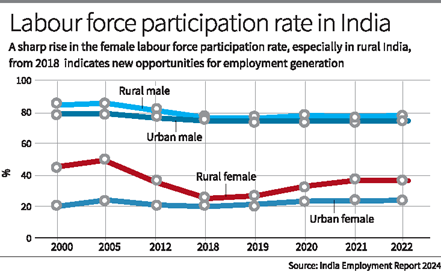Table of Contents
Context: The India Employment Report (IER) 2024 highlights a complex employment scenario with rising unemployment rates. It was published by the Institute for Human Development and the International Labour Organization.
India Employment Report (IER) 2024: Key Findings
- Unemployment Rate:
- Increased from a little over 2% in 2000 and 2012 to 5.8% in 2019.
- Reduced to 4.1% in 2022.
- Time-related underemployment was high at 7.5%.
- Labour Force Participation Rate (LFPR): Declined from 61.6% in 2000 to 49.8% in 2018.
- Recovered to 55.2% in 2022.
- Female LFPR: Rose from 24.6% in 2018 to 36.6% in 2022 in rural India.
- Increased by around 3.5% from 20.4% in 2018 in urban areas.
- Compared to the world average of 53.4% (2019), it decreased from 38.9% in 2000 to 23.3% in 2018.

- Gender Disparities in Employment:
- Unpaid Family Labour: 9.3% of males vs. 36.5% of females were employed as unpaid family workers in 2022.
- In rural areas, the difference was 31.4% vs. 8.1% in urban areas.
- Employment Choices: Women preferred traditional home-based occupations due to flexibility.
- 30% of women in Bhuj, Gujarat, were stuck in traditional jobs due to lack of other options.
- Male dominance in business limited women’s entrepreneurship.
- Unpaid Family Labour: 9.3% of males vs. 36.5% of females were employed as unpaid family workers in 2022.
Strategies for Female Employment Generation
- Collectivising Women: Self-help groups (SHG) and federations can benefit women in traditional occupations.
- Training and direct market linkages through federations can improve returns.
- Example: Kutch Mahila Vikas Sangathan (KMVS) in Gujarat.
- Irrigation: The expansion of less dominant irrigation sources like canals increased female wages and decision-making abilities.
- Example: Upper Gangetic Plains in Uttarakhand and Uttar Pradesh.
- Non-conventional Irrigation: Enabled women to start farming, pisciculture, and other activities.
- Example: West Bengal Accelerated Development of Minor Irrigation Project.
- Reduced female migration and increased family welfare.
Benefits Of Female Employment
- Enhancing women’s workforce participation improves family income and women’s position in the family.
- Women’s participation in the workforce reduced economic vulnerability.
Policy Recommendations
- Better Work Environment: Focus on basic facilities like toilets and crèches.
- Public policy should mandate these in small and medium business units.
- Rural Areas: Provide access to resources (water) and markets.
- Urban Areas: Improve workplace facilities.
- Economic Collectives: Federate women in planned economic activities.
- Example: Lakhpati Didi programme aiming for an SHG woman’s annual income of ₹1 lakh or above.


 GPS Spoofing and Its Impact in India: A ...
GPS Spoofing and Its Impact in India: A ...
 Amrit Gyaan Kosh Portal: A Comprehensive...
Amrit Gyaan Kosh Portal: A Comprehensive...
 Regional Rural Banks in India, Objective...
Regional Rural Banks in India, Objective...





















